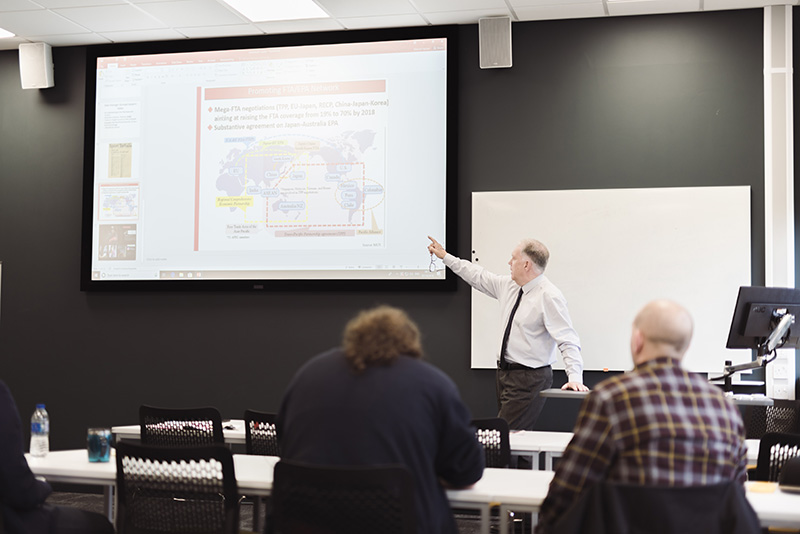BA (Hons) International Business (with Industry Placement)

Course details
UCAS Code
IBIP
Year of entry
2025, 2026
Duration
4 YRS (FT)
UCAS Tariff
96-112
Institution Code
G53
Location
Wrexham
Course Highlights
Bronze member
of the Business Graduates Association with access to a range of benefits including consultative services and the BGA eLearning hub
Top 10
in the UK for Teaching Satisfaction*
Achieve
a Level 5 CMI Diploma in Leadership & Management upon graduation
Why choose this course?
Our BA (Hons) in International Business allows students to see how globalisation has brought about an increasing 'connectedness' of businesses, markets, people and information across countries and gives students understanding of the different business management practices found all over the world.
You will:
- Inspire your commercial acumen and management skills.
- Develop the knowledge and abilities to prepare for graduate careers working abroad or in organisations that are engaged in business on a global scale.
- Gain a broad insight into the world of business and management from academics and industry professionals with a wealth of experience.
- Study modules designed with an emphasis on international, contemporary and practical business issues to ensure graduates are ready for the job market.
- Upon graduating also achieve a level 5 Diploma/Certificate in Leadership & Management from the Chartered Management Institute worth over £1,300 at no extra cost.
*This subject area is rated top 10 in the UK for Satisfied with Teaching in the Business and Management subject area league table in the Guardian University Guide, 2025.

Key course features
- Gain a broad insight into the world of international business and management from academics and industry professionals with a wealth of experience.
- Acquire the essential knowledge and skills required for working effectively across different national contexts, in a range of business and management roles.
- Gain an understanding of international management, business operations, corporate strategy, and human resources.
What you will study
YEAR 1 (LEVEL 4)
MODULES
- Introduction to Management & Business: This module will introduce students to some of the fundamentals of business, including organisational structure and the nature of the modern business practices. It will also provide opportunities for the student to acquire a broad understanding of management by exploring the skills and characteristics of effective managers and leaders, and techniques to successfully manage a team.
- Introduction to Business Finance & Accounting: This module aims to introduce the contemporary concepts and principles of accounting and finance so as to enhance the abilities of the students, by applying relevant management accounting, financial accounting and financial management techniques, to determine the most appropriate operational financial decisions, and analyse the effects of those decisions on a firm’s performance and financial position.
- Human Resource Management in Context: This module provides a comprehensive understanding of the role of human resource management (HRM) in organisations. The module covers the following HRM fundamentals:
- Types of organisation prevalent in the business world
- The importance of human resource management and the role of HR practitioners
- HR activities in organisations
- Impact of technology on human resource management
- Marketing Essentials: This module is about recognising the importance of marketing’s role in driving success and delivering results. Students will learn about the different functions of marketing in the 21st century and will study how an appreciation of consumer behaviour and the marketing environment can enable effective targeting and planning. By the end of this module students will have gained an awareness of the various tools available to the modern day marketer, and be capable of recognising their strengths and weaknesses, enabling them to use them both creatively and effectively in an operational context including commercial and non-profit sector organisations.
- Business Communication Skills: The module aim is to recognize the importance of effective integrated internal and external communications in building sustainable relationships and delivering customer value. Students will also learn how to communicate effectively in a business and academic settings understanding the fundamentals of presentation skills, written communication and professional communication.
- Business Analytics: This module aims to develop a critical and practical understanding of the concepts and principles of analytics and the ability to apply these concepts to the systematic analysis of data within the contemporary business world.
YEAR 2 (LEVEL 5)
CORE MODULES
- International Business and Trade: This module aims to develop a critical and practical understanding of the concepts and principles of international business and trade and the ability to apply these concepts to the contemporary international business world. The module explains the main concepts, principles and functions of international business and globalisation and applies the challenges of international business culture to realistic commercial situations. This includes a practical understanding of the global financial system and an evaluation of theories of international trade in terms of its commercial consequences. International business strategy will also be assessed and applied in terms of its commercial consequences.
- Entrepreneurship and Innovations: This module aims to provide students with the opportunity to discover how ideas are developed, how entrepreneurship operates and an understanding of Innovation and entrepreneurship theories within a business context. It will enable students to enhance their employment prospects in the workplace by providing them with an understanding of the sought-after traits of entrepreneurship and innovation and how to express them.
- Digital Business Strategy: This module aims to equip students with the skills needed to build digital competitive advantage in a rapidly changing world. The rules of business have changed and why it is no longer enough for firms to be better or cheaper to gain competitive advantage. These new rules make it essential for companies to re-examine four fundamental aspects of their business to thrive in the digital era—their strategy, value chain, customer engagement, and organisation structure.
- Agile Leadership: This module aims to develop a critical and practical understanding of the concepts and principles of agile leadership and the ability to apply these concepts within the contemporary business world, to create the right environment for agile teams to succeed within an organisation.
- Professional Behaviours and Valuing People: This module provides a platform for students to develop and enhance their core professional behaviours and skills, including ethics, values and professionalism, that will help to build positive relations at workplace and improve employee performance, participation and wellbeing. The module will also enable students to understand continuing professional development and identify developmental needs.
OPTIONAL MODULES
- Digital Marketing Techniques: This module covers the evolving nature of digital marketing concepts and use of digital techniques within organisations. The module covers three units: the first unit relates to the understanding, application and assessment of digital tools and techniques; the second unit is about developing knowledge to apply integrated digital marketing processes, which enhance the organisation’s engagement with stakeholders; and the third unit is about the development and evaluation of digital marketing plans.
- Managing International Visitor Attractions: This module provides students with the opportunity to develop a comprehensive understanding of the development and management of global visitor attractions. The specific natures of a variety of attractions are introduced to illustrate the diversity of management requirements necessary to ensure both the maintenance of the attraction and the satisfaction of visitor needs. The module will introduce students to the range and diversity of natural and man-made attractions across the globe and provide a deep understanding of the governance, marketing, and operational issues of opening attractions to the public whilst providing a quality visitor experience.
- Industrial Placement: The module aims to provide students with the opportunity to gain valuable experience in the workplace, specifically related to the student’s specialism, via first-hand experience. This module allows students to undertake a sustained period, embedded with a host employer, to work on one or more defined projects or goals. The student will be expected to find and secure a suitable placement opportunity in collaboration with NWBS. The Industry Placement will typically take place during the normal academic year, over the two normal university semesters. However, where necessary, it may start earlier and finish earlier where required by industry. As such its duration should normally be in the region of 40 weeks dependent on working hours.
YEAR 3 (INDUSTRY PLACEMENT)
- Industry Placement (Core): The module aims to provide students with the opportunity to gain valuable experience in the workplace, specifically related to the student’s specialism, via first-hand experience. This module allows students to undertake a sustained period, embedded with a host employer, to work on one or more defined projects or goals. The student will be expected to find and secure a suitable placement opportunity in collaboration with NWBS. The Industry Placement will typically take place during the normal academic year, over the two normal university semesters. However, where necessary, it may start earlier and finish earlier where required by industry. As such its duration should normally be in the region of 40 weeks dependent on working hours.
YEAR 4 (LEVEL 6)
CORE MODULES
- Strategic Management: This module presents a systematic approach to the study of strategic management, building upon an array of ideas and theories ranging from industrial organization theory to institutional economics. This unit outlines the fundamentals of strategic management and gives students an introduction in this important area of business management. Students will gain an awareness of the issues involved and the techniques that managers adopt. The tools and techniques will help students understand how organisations achieve sustainable competitive advantage.
- Managing International Sustainability: The module aims to raise awareness among students as to the meaning of sustainability in a global sense, but in particular within a business context. The module will investigate the three pillars of sustainability and critically evaluate and assess the main principles and theories of managing global sustainability and sustainable development. The role of sustainability within organisations will be evaluated as well as the contribution that global sustainability and sustainable development makes to broader organisational outcomes.
- Managing People in an International Context: This module provides comprehensive knowledge and understanding of managing people in an international context. The impact of national and cultural contexts, international human resource management approaches (IHRM) and the future of IHRM will be covered as part of this module.
- Dissertation: The aim of the dissertation module is for students to demonstrate the application of knowledge and skills gained during the undergraduate programme of study in all programme routes in an independent, self-motivated, enquiring and problem-solving manner. This serves to extend, underpin and enhance learning through the identification of a business/management problem in either business, accounting & finance, HTEM, HRM, Marketing and any other business related area which requires theoretical research, structured data.
OPTIONAL MODULES
- Strategic Marketing: This module aims to build on the marketing foundations studied previously and provides a staged approach to the nature of strategic marketing which contribute to the achievement of a competitive advantage. It will introduce the broader aspects of strategic marketing that reflect contemporary developments in advocacy and ethics.
- International Supply Chain Management: This module aims to develop knowledge and critical understanding of supply chain management as it operates on a transnational basis. To this end it enables students to critically evaluate alternative procurement, contractual arrangements and supply chain processes in terms of inputs, tools, techniques and outputs. It also facilitates learning to analyse problems and develop creative solutions.
The information listed in this section is an overview of the academic content of the programme that will take the form of either core or option modules. Modules are designated as core or option in accordance with professional body requirements and internal academic framework review, so may be subject to change.
Entry requirements & applying
The academic requirements for the course are 96-112 UCAS tariff points at GCE A-level or equivalent, from a minimum of two A levels and GCSE Mathematics and English/Welsh (First Language) at Grade C/4 or equivalent. Appropriate AS-Level and Level 3 Key Skills qualifications will also be taken into account.
Teaching & Assessment
Students are assessed in a variety of ways over the course of their undergraduate studies. The balance between the different forms of assessment is determined by the different aims and learning outcomes of the core and option modules. Assessment methods include academic essays, presentations, reports, simulation exercises and examinations.
TEACHING AND LEARNING
Teaching methods include workshop-based core skills modules, lectures by practitioners, student-led seminars and guided research.
Independent learning is an important aspect of all modules, as it enables students to develop both their subject specific and key skills. Independent learning is promoted through the feedback given to students, which takes several forms including small group and one-to-one discussions.
Wrexham University is committed to supporting our students to maximise their academic potential.
We offer workshops and support sessions in areas such as academic writing, effective note-making and preparing for assignments. Students can book appointments with academic skills tutors dedicated to helping them deal with the practicalities of university work. Our student support section has more information on the help available.
In terms of particular needs, the University’s Inclusion Services can provide appropriate guidance and support should any students require reasonable adjustments to be made because of a recognised prevailing disability, medical condition, or specific learning difference.
Career prospects
Our Careers & Employability service is there to help you make decisions and plan the next steps towards a bright future. From finding work or further study to working out your interests, skills and aspirations, they can provide you with the expert information, advice and guidance you need.
Our international business degree opens a variety of careers and students can also use their knowledge to internationalise their own business ideas. Specific careers include:
- Business Adviser
- Business Analyst
- Management Consultant
- Marketing Executive
- Corporate Investment Banker
Fees & funding
You do not have to pay your tuition fees upfront.
The fees you pay and the support available will depend on a number of different factors. Full information can be found on our fees & finance pages. You will also find information about what your fees include in the fee FAQs.
All fees are subject to any changes in government policy, view our undergraduate fees.
Programme specification
You can see the full programme specification here.Accommodation
At Wrexham University, we offer on-campus en-suite rooms within our Wrexham Student Village. These private, fully furnished spaces are conveniently located, providing easy access to campus facilities, study areas, and social spaces. Plus, you’re just a 10-minute walk from the city centre!
With all bills included, free Wi-Fi, 24/7 security, and large social areas, you’ll find everything you need for a great student experience.
Explore our student accommodation options to find your perfect home away from home.

Business atWrexham University
Thinking of a career in Business? Hear from lecturers and students about our various Business degrees at Wrexham University.







